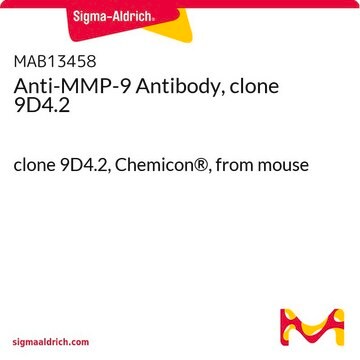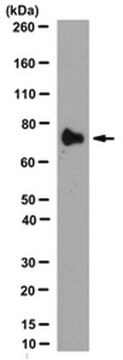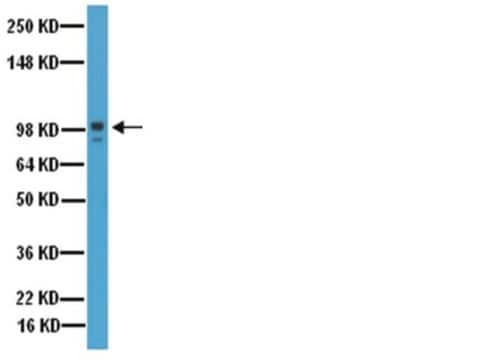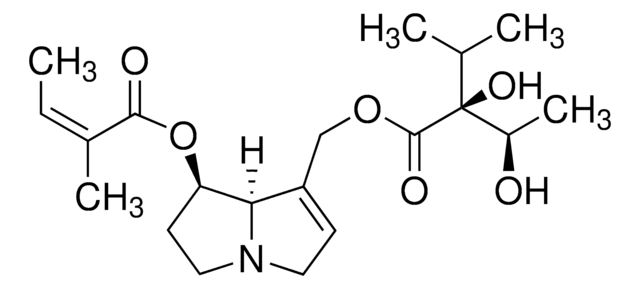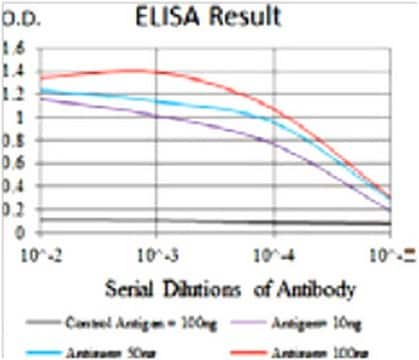MAB13415
Anti-MMP-9 Antibody, clone GE-213
clone GE-213, Chemicon®, from mouse
Synonym(s):
Gelatinase B, 92 kDa Type IV Collagenase
About This Item
Recommended Products
biological source
mouse
Quality Level
antibody form
purified antibody
antibody product type
primary antibodies
clone
GE-213, monoclonal
species reactivity
human
manufacturer/tradename
Chemicon®
technique(s)
immunohistochemistry: suitable
immunoprecipitation (IP): suitable
western blot: suitable
isotype
IgG1
NCBI accession no.
UniProt accession no.
shipped in
wet ice
target post-translational modification
unmodified
Gene Information
human ... MMP9(4318)
Specificity
Immunogen
Application
Cell Structure
MMPs & TIMPs
Immunohistochemistry (Acetone-fixed frozen; Hurskainen, 1996): 1:100 for 30 minutes at room temperature
Immunoprecipitation: 2-5 μg/mg protein lysate (use protein G to precipitate immune complex).
Inhibition of MMP-9 Activity: 2-4μg/mL (Visscher, 1994)
Optimal working dilutions must be determined by end user.
Linkage
Physical form
Storage and Stability
During shipment, small volumes of product will occasionally become entrapped in the seal of the product vial. For products with volumes of 200μL or less, we recommend gently tapping the vial on a hard surface or briefly centrifuging the vial in a tabletop centrifuge to dislodge any liquid in the container′s cap.
Analysis Note
POSITIVE CONTROL: Cytotrophoblastic columns, the endothelial and fibroblastic stromal cells of villi, and the large decidualized cells of decidual membrane in placenta (Hurskainen et al., 1996). Macrophages in arteries (Nikkari et al., 1996), and fibroblast, endothelial, and tumor cells in breast carcinomas (Soini et al., 1994; Visscher et al., 1994). Conditioned serum-free medium from (dexamethasone-treated) human fibrosarcoma HT-10801 (Nikkari et al., 1996) or endothelial HUVEC4 (Schnaper et al., 1993) cells.
Other Notes
Legal Information
Disclaimer
Unless otherwise stated in our catalog or other company documentation accompanying the product(s), our products are intended for research use only and are not to be used for any other purpose, which includes but is not limited to, unauthorized commercial uses, in vitro diagnostic uses, ex vivo or in vivo therapeutic uses or any type of consumption or application to humans or animals.
Not finding the right product?
Try our Product Selector Tool.
Storage Class Code
12 - Non Combustible Liquids
WGK
WGK 2
Flash Point(F)
Not applicable
Flash Point(C)
Not applicable
Certificates of Analysis (COA)
Search for Certificates of Analysis (COA) by entering the products Lot/Batch Number. Lot and Batch Numbers can be found on a product’s label following the words ‘Lot’ or ‘Batch’.
Already Own This Product?
Find documentation for the products that you have recently purchased in the Document Library.
Our team of scientists has experience in all areas of research including Life Science, Material Science, Chemical Synthesis, Chromatography, Analytical and many others.
Contact Technical Service